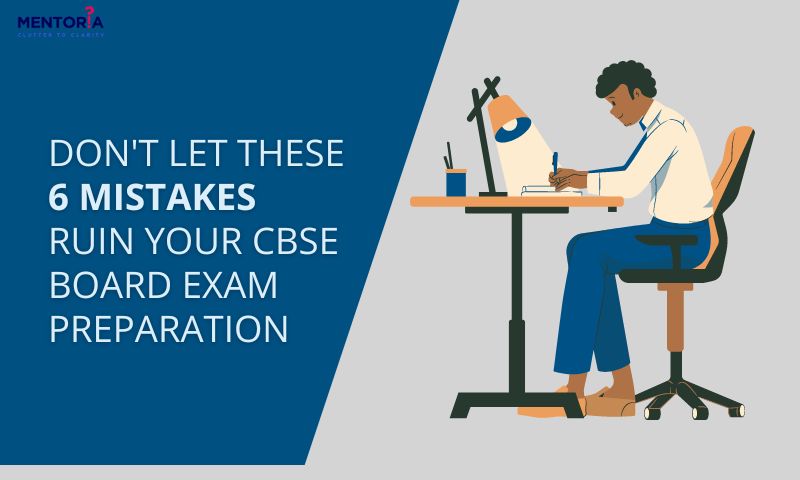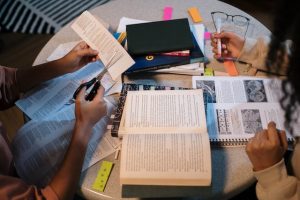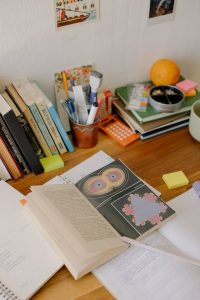Don’t Let These 6 Mistakes Ruin Your CBSE Board Exam Preparation

Jump to Section
With the slow but steady approach of the CBSE exams, students fully commit to the task of exam preparation. For the preparation, students are forced to study day and night. It can be very frustrating to study because you don’t see yourself making progress, you worry ahead of time, and you feel like you’re wasting your time and not learning anything. However, despite these challenges, you still need to stay motivated and strive to avoid common mistakes that students make to be well-prepared for your journey to change your life.
In this article, we will explore the importance of proper preparation, real-life student problems, six mistakes that students often make while preparing for the CBSE Board Exam, offer practical tips to avoid them, and tips for the day before exams.
Beating Study Stress For A Balanced Student Life
Research conducted by ReachOut reveals that study stress is impacting students’ mental health, sleep, and relationships. This new information underscores the significance of proper exam preparation, shedding light on the challenges students face and the importance of addressing them to mitigate the adverse effects on their well-being.
National survey of over 600 young people aged 16-25 years, conducted by ReachOut in August and September 2022.
- When asked what they have been concerned, worried and stressed about in the last year, study stress was the second issue of concern (over 71% of those surveyed), following worry and stress about the future. 66% of young people surveyed said it was the most concerning issue for them.
- 48% of young people surveyed were extremely stressed about their studies.
- 46% of the sample who experienced study stress said that it had a major impact on their mental health and wellbeing.
The survey showed that changes that occurred in young people’s lives due to stress and worry related to study included:
- Lack of motivation and not doing things they enjoy (75%)
- Trouble sleeping (too little or too much) (73%)
- Trouble focusing (72%)
- Changes to their mood (71%)
- Took time off work or study due to study and exam stress (42%)
- Experienced challenges within their relationships with their friends, families or partner due to study stress (39%)
- Experienced poor physical health or illness (37%)
When asked what it was concerning young people about study in particular, the most common responses were:
- Worry about not being able to live the life they have planned for themselves (58%)
- Worry about how they will compare with other students (55%)
- Worried they would let their family down (49%)
- Worry about getting a job (47%)
- Concern about getting into the course they want to (41%)
- Concerns related to the impacts of covid were only applicable for 12% of those surveyed.
So, to avoid all those problems by which students face problems mentioned above, proper preparation is the key to success in any endeavour, and the CBSE Board Exam is no exception. It’s crucial to start early and make a study plan that allows for sufficient time to cover all the subjects and topics. By starting early, you give yourself ample time to revise and reinforce your understanding of the concepts. Studying and preparing for exams not only helps us get better grades, but it also has many other benefits. Some of them are:
- Improved Academic Performance: By studying constantly and effectively, we can improve our performance in exams and, in general, in all subjects.
- Developing Organisational Skills: Preparing for exams requires us to organise our time and resources efficiently, which develops our planning and organisational skills.
- Greater Confidence: By being well prepared, we feel more confident in our knowledge, which can reduce anxiety and stress during exams.
- Improved Information Retention: Regular, structured studying helps us retain information better in the long term, which benefits us not only in exams, but also in our academic and professional lives.
A well-planned study schedule helps in managing time effectively and ensures that you have enough time to revise and practice. It also helps in reducing stress and anxiety, as you have a clear roadmap of what needs to be done. So, make sure to allocate specific time slots for each subject and topic in your study schedule.
Common Struggles Students Face In Real-Life Situations
To better understand the mistakes that students make while preparing for the CBSE Board Exam, let’s take a look at a real-life student situation. Meet Ravi, a diligent student who aspires to score high in the upcoming exam. However, due to a lack of proper planning and guidance, Ravi finds himself struggling to cover all the topics and ends up feeling overwhelmed and stressed.
Ravi’s biggest mistake is procrastination. He often finds himself putting off studying until the last minute, which leads to cramming and poor performance. Another common mistake Ravi makes is neglecting certain subjects or topics that he finds difficult, thinking he can make up for them later. But this approach backfires, as he realises that those neglected topics carry significant weightage in the exam. Relying solely on textbooks limits his understanding, and attempts to diversify with various study materials overwhelm him, leading to confusion. Not practising enough with previous year’s question papers hinders his ability to assess preparedness and improve time management. Amidst the academic pressure, Ravi neglects self-care, experiencing burnout, reduced focus, and decreased productivity. These challenges highlight the importance of addressing these common pitfalls in a student’s studying approach for effective exam preparation. Here are some more common mistakes made by students and tips to solve it, let’s dive in.
Mistake 1: Procrastination And Lack Of Consistent Studying
Procrastination is the enemy of productivity, especially when it comes to exam preparation. Many students fall into the trap of thinking they have plenty of time and end up delaying their study sessions until the last minute. This not only leads to unnecessary stress but also hampers the ability to retain information effectively.
To avoid procrastination, it’s important to create a study routine and stick to it. Allocate specific time slots each day for studying, and make it a habit to follow through. Break down your study sessions into smaller, manageable chunks, and take short breaks in between to keep your mind fresh and focused.
Consistency is key. Instead of studying for long hours, try to study for shorter periods but consistently. This will help in better retention of information and prevent burnout. Remember, slow and steady progress is better than last-minute cramming.
Like the example of Ravi that we have mentioned above who thought there was plenty of time to study for exams. Days turned into weeks, and suddenly, the exams were around the corner. Panicking, Ravi crammed all the information at the last minute, feeling stressed and struggling to remember details. The takeaway? Procrastination leads to unnecessary stress and makes learning harder.
Mistake 2: Neglecting Important Subjects Or Topics
Another mistake that students often make is neglecting certain subjects or topics that they find difficult or less interesting. This can be a huge disadvantage, as the CBSE Board Exam tests your knowledge across all subjects. Neglecting any subject or topic can result in lower overall scores.
To avoid this mistake, it’s important to allocate sufficient time for each subject and topic in your study schedule. Identify the subjects or topics that you find challenging and devote extra time and effort to understanding them. Seek help from your teachers or classmates if needed, and make use of online resources and study materials to supplement your learning.
Remember, every subject and topic is important, and a comprehensive understanding of all concepts will greatly benefit your overall performance in the exam.
Again, consider Ravi’s example who has a habit of neglecting subjects he finds challenging. Ravi decided to skip over the complex topics, thinking he could focus on the subjects he found easier and more interesting. As the CBSE Board Exam approached, Ravi realised his mistake when he struggled with the neglected topics during the actual test. The result? Lower scores and a valuable lesson about the importance of giving attention to all subjects for overall success.
Mistake 3: Relying Solely On Textbooks
While textbooks are an essential resource for exam preparation, relying solely on them can limit your understanding of the subjects. Textbooks often provide a summarise version of the concepts, and exploring different learning resources can provide a more comprehensive understanding.
To avoid this mistake, diversify your study materials. Make use of reference books, online tutorials, video lectures, and interactive learning platforms. These resources can provide different perspectives and explanations, making it easier to grasp complex concepts. Additionally, practice solving questions from various sources to reinforce your understanding and improve your problem-solving skills. Remember, a wider range of study materials can enhance your knowledge and provide a well-rounded preparation for the CBSE Board Exam.
Ravi, aiming for board exam preparation, solely relied on his textbooks. As the CBSE Board Exam neared, he realised his understanding of certain concepts was limited. Regretting the decision to solely depend on textbooks, Ravi diversified his study materials, incorporating reference books and online resources. The result? A more profound understanding of subjects, improved problem-solving skills, and a valuable lesson about the importance of using a variety of learning resources.
Mistake 4: Overloading With Study Materials And Resources
While it’s essential to diversify your study materials, overloading yourself with too many resources can have its drawbacks. It’s easy to get overwhelmed and confused when you have an abundance of study materials at your disposal.
To avoid this mistake, be selective in choosing your study materials. Stick to a few trusted resources that align with your learning style and preferences. Quality over quantity is key. Focus on understanding the concepts thoroughly rather than collecting an excessive amount of study materials. Organise your study materials and create a system that works for you. This can include using colour-coded notes, creating mind maps, or using digital tools to keep track of important information like Google notes, Google docs etc. By streamlining your study materials and resources, you can optimise your study sessions and improve your overall efficiency.
In Ravi’s journey to excel in the CBSE Board Exam, his well-intentioned effort to diversify study materials took a wrong turn. Overloading himself with numerous resources, Ravi became overwhelmed and confused. The abundance of materials, instead of aiding his preparation, hindered his understanding.
This situation highlights the importance of being selective in study material choices. Ravi’s mistake teaches us to prioritise quality over quantity, emphasising a focused approach that aligns with individual learning preferences. By organising study materials, employing tools like colour-coded notes or digital platforms, Ravi could have streamlined his resources, enhancing study sessions and overall efficiency.
Mistake 5: Not Practising Enough With Previous Year Question Papers
Practising with the previous year’s question papers s an essential part of exam preparation. It helps you familiarise yourself with the exam pattern, understand the types of questions asked, and assess your level of preparedness.
Not practising enough with the previous year’s question papers is a common mistake that can leave you unprepared for the actual exam. It’s important to set aside time to solve these papers and simulate the exam environment as closely as possible. Analyse your performance, identify your strengths and weaknesses, and work on improving them.
Additionally, practising with question papers helps in improving your time management skills. It allows you to gauge how much time you should allocate for each section and question, ensuring that you complete the exam within the given time frame.
In Ravi’s preparation for the CBSE Board Exam, he underestimated the significance of practising with previous year’s question papers. Caught up in other study methods, Ravi neglected this valuable resource, failing to familiarise himself with the exam pattern and types of questions.
Ravi’s oversight serves as a lesson. By not practising enough with question papers, he missed a crucial opportunity to assess his preparedness, identify strengths and weaknesses, and refine his study strategy. Had Ravi dedicated time to simulate the exam environment and analyse his performance, he could have pinpointed areas for improvement, enhancing both his readiness and time management skills.
Mistake 6: Ignoring Self-Care And Stress Management
Amidst the pressure of exam preparation, it’s easy to neglect self-care and stress management. However, taking care of your physical and mental well-being is crucial for optimal performance.
Ignoring self-care can lead to burnout, lack of focus, and decreased productivity. Make sure to prioritise activities that help you relax and recharge. Engage in regular physical exercise, practice meditation or mindfulness techniques, and maintain a balanced diet. These activities promote mental clarity, reduce stress, and improve overall well-being.
Additionally, don’t forget to take breaks during your study sessions. Short breaks can enhance your productivity by giving your brain a chance to rest and process information. Use these breaks to engage in activities you enjoy, such as listening to music, going for a walk, or spending time with family and friends.
In Ravi’s intense preparation for the CBSE Board Exam, he overlooked the importance of self-care and stress management. Focused solely on study sessions, Ravi experienced burnout, diminishing his focus and productivity.
Ravi’s situation serves as a reminder that neglecting self-care can have detrimental effects. By incorporating regular breaks, physical exercise, and mindfulness techniques, Ravi could have rejuvenated his mind and maintained optimal performance. Learning from Ravi’s oversight, students should prioritise activities that promote relaxation, ensuring a healthy balance between exam preparation and well-being.
How Smart Preparation Can Help You Ace Your CBSE Exams
Having explored the common pitfalls in exam preparation, let’s now shift our focus to constructive strategies for success. It’s essential to transition from what not to do to what should be done when gearing up for exams.
First of all, you have to start by being honest with yourself. We have already said that everyone has their weak points. Report these and try to work on them as quickly as possible. Video game addiction, for example, is a serious problem that can have major consequences in studies. Once you have finished identifying them, talk about them to get the necessary help. It’s all a question of timing. Do it in such a way that shortly after school starts, you are already in exam mode. Because yes, preparing for exams is also a matter of state of mind. We talked about stress management and underestimating subjects, all of this goes back to the state of mind, the mindset.
The mindset is essential because it is what will guide you toward success. It is the one who will accompany you when you are in front of your exam paper. So don’t waste your time on excessive distractions or other trivialities. Don’t expect your classmates to take the exam for you, or to provide you with the answers. Count on yourself, and believe in yourself. Work smart, and start early. Procrastination will only lead you to wait until the last day, and we already know that’s not a good thing.
What To Do Right Before An Exam
Here are some tips to do right before your exams
- Get enough sleep the night before
- Eat a healthy meal before the exam
- Arrive early at the exam location
- Bring all necessary materials, such as Pencils, Pens and Geometry box etc.
- Take a moment to relax before the exam
Navigate Prep, Avoid Mistakes
Preparing for the CBSE Board Exam 2024 requires proper planning and dedication.To succeed on this exam, it is important to prepare properly, manage your time properly, follow scoring guidelines, and avoid common mistakes. It is also important to overcome common difficulties when studying and prepare adequately before the exam. By understanding and addressing these mistakes, you can set yourself up for success.
Discover Your Potential with Mentoria’s Student Guidance. Whether you’re aiming to excel in your studies, explore new academic paths, or switch to a different field, our mentors will craft a personalised plan for you. Offering various streams, 850+ courses, and insights into 12,000+ careers, we’re here to help you discover your ideal academic fit. Connect with our mentors today to kick-start your journey toward a fulfilling and successful student life













